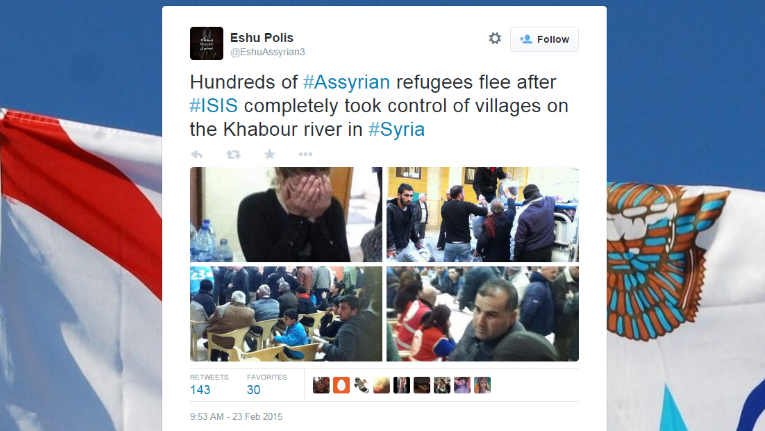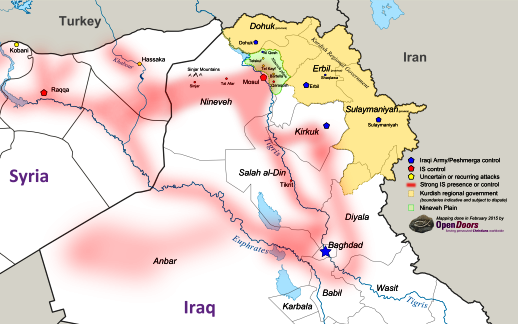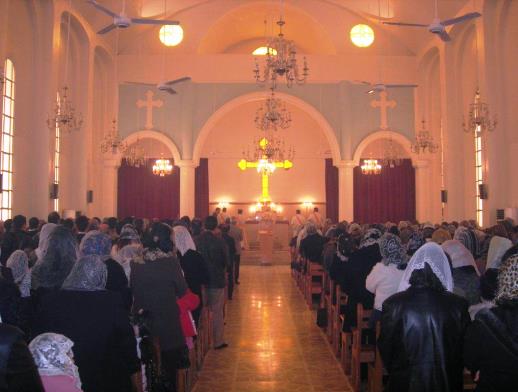Update (Feb. 25): Assyrian activists tell CNN that they expect ISIS to release a video today threatening to kill the approximately 150 Christian captives unless President Obama and other leaders end joint air strikes against the group.
An "official" confirmed the claim, CNN noted Wednesday morning on its Twitter account.
The Assyrian Human Rights Network has been chronicling the attack's aftermath via photos on its Facebook page. The US State Department said it "condemns [the attack] in the strongest possible terms."
CT will update this post as events unfold.
—–
ISIS militants launched surprise attacks on 35 Christian villages along a river in northeast Syria yesterday, taking an estimated 100 to 200 hostages. Coming one week after the videotaped beheadings of 21 Christians in Libya, the incident raises concern of whether a prisoner swap or another propaganda-driven massacre is in the making.
The fierce offensive along a 40-kilometer stretch of the Khabour River in Hassaka province forced some 3,000 Assyrian Christians to flee their homes. A teenage Christian boy and four Assyrian militia fighters were reported killed in the first day of fighting, and dozens of Assyrian men, women, and children were reported to be held hostage by the self-proclaimed Islamic State.
Militants seized an unconfirmed number of Christians from at least 100 Assyrian families in the attacks, according to a Christian source in Hassaka city who spoke on Tuesday morning with Archimandrite Emanuel Youkhana, of the Assyrian Church of the East.
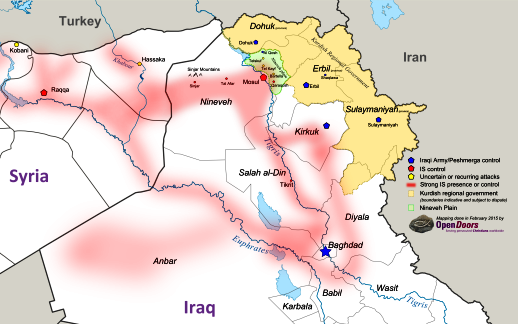
The hostages were taken prisoner in Tel Shamiran, Tel Goran, Tel Jezirah, and Tel Hormizd. In these four villages, the source said, the ISIS militants separated the captured men from their families, leaving the women and children under guard in their homes.
In light of the ISIS militants’ “barbaric record with the captured,” Youkhana said, “the destiny of these families is a major concern to us.”
Middle East Concern noted:
The reason for the abductions has not been stated. There is speculation that the abductees may be used in negotiations for the release of Daesh [Islamic State] militants captured by Kurdish militias. However, there is grave concern over the fate of the Christians, especially in view of the recent murder of 21 Christians by Daesh-affiliated militants in Libya.
According to Rudaw, a regional Kurdish news group, wireless conversations between ISIS jihadists were overheard claiming that “56 crusaders” had been taken prisoner from one Christian village. The Syrian Observatory for Human Rights reported “at least 90” Assyrians had been captured.
In an otherwise unconfirmed claim, Newsweek reports that ISIS has demanded a prisoner exchange with the Kurdish forces: “They are seeking the release of ISIS members in exchange for the villagers. The exact number of prisoners ISIS is looking to swap for is not known. They have threatened the lives of the village men, estimated to be more than 100, if the swap does not go through.”
By nightfall Monday [Feb. 23], Youkhana said, more than 600 Christian Assyrian families had fled to Hassaka and Qamishli, two of Syria’s 10 largest cities. Although nearby Sunni Arab villages “in general” supported the ISIS takeover, his source said, some Sunni Arabs near Qabr Shamya intervened to rescue 15 trapped Assyrians, guiding them to safety in Hassaka city.
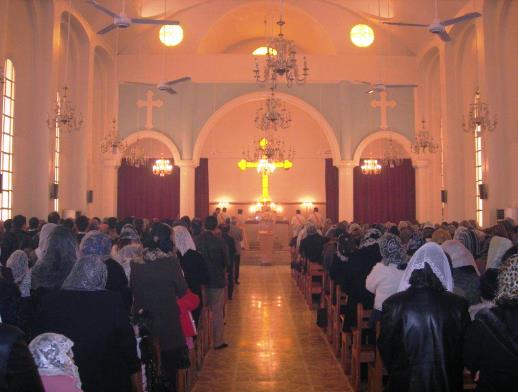 World Watch Monitor
World Watch MonitorAccording to Mar Aprem Nathniel, Bishop of Syria of the Assyrian Church of the East, St. Mary’s Church in Hassaka was “overloaded with the people” on Monday evening, until most were dispersed to local Christian homes in the city.
As fighting intensified for control of Tel Tamar and other villages, the limited Assyrian Christian militia forces were bolstered by a contingent of Syrian Kurdish fighters from the Democratic Union Party, along with air strikes by the Syrian army.
According to Hassake sources, the ISIS forces failed to advance. “We hope ISIS will be defeated in the next days,” Youkhana said, noting that the Khabour River has served as a natural defense line for the Christian villages.
According to unconfirmed reports, churches in Tel Hormizd and Tel Shamiram have been set on fire.
On Feb. 1, ISIS jihadists had ordered Christians in the Hassaka region to remove the crosses from their churches and be prepared to pay a jizya tax. A similar demand had been posted online a year ago by ISIS, demanding similar requirements from Christians in the Syrian city of Raqqa, which ISIS seized last year and proclaimed to be its capital.
Khabour’s Assyrian Christians had resettled in Syria after 1933, fleeing the Kingdom of Iraq’s Simele massacre, which targeted ethnic Assyrians. Before the Syrian civil war began four years ago, they numbered about 400,000, about 5 percent of the national population.
Hassaka city is just 55 kilometers from the province’s eastern border with Iraq. The province is particularly strategic for the coalition fighting ISIS, situated at a pivotal point bordering Turkey as well as the Iraqi regions under the jihadists’ control.
[Editor's note: Assyrian Christians can be traced back to 2400 BC. They speak Aramaic, a language in which Mark quotes Jesus several times in his gospel, and converted to Christianity early in the church's history. The community has regularly faced attack and since the 1930s, more Assyrians have have lived outside the Middle East than inside Iraq.
While some in the community cheered after Saddam Hussein was overthrown (despite Iraq’s relative religious lenience toward Christians), many were eventually forced to flee and resettle in Syria after escaping violence in Iraq later that decade. Since the outbreak of the Syrian Civil War, thousands of Assyrian refugees have fled to Turkey.
The kidnapping of the Assyrian Christians comes just weeks after the videotaped deaths of 21 Coptic Christians in Libya, which has led to Christian-Muslim unity in Egypt and the distribution of 1.65 million tracts, the Bible Society of Egypt's largest campaign ever.
CT has previously reported on ISIS’ capture of Iraq’s Christian capital, the exodus of Mosul’s last Christians, and the different strategies Middle Eastern evangelicals have explored to combat ISIS.
CT has examined why ISIS must be stopped (no special pleading on behalf of Christians required), and whether Islam encourages violence more than other religions.]
[Image: Twitter screenshot – Eshu Polis]

